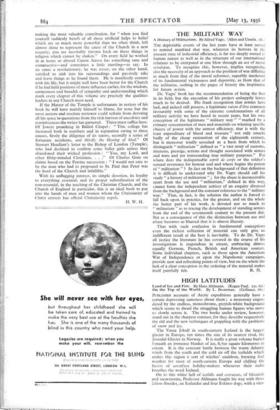THE MILITARY WAY
A History of Militarism. By Alfred Vagts. (Allen and Unwin. 18s.) THE deplorable events of the last years have at least served to remind mankind that war, whatever its horrors in the present state of industrial efficiency, is far too deeply rooted in human nature as well as in the structure of our international relations to be extirpated at one blow through an act of moral revulsion. To recognise this, however, implies recognising also the necessity of an approach to the problem of war differing as much from that of the moral reformer, superbly intolerant of its fundamental viciousness and depravity, as from that of the militarist, seeking in the pages of history the inspiration for future action.
Dr. Vagts' book has the recommendation of being the first in its field, but the execution of his project unhappily leaves much to be desired. His frank recognition that armies have had, and indeed still possess, a legitimate raison d'être contrasts favourably with some of the extreme condemnations of all military activity we have heard in recent years, but his own conception of the legitimate " military way " " marked by a primary concentration of men and materials on winning specific objects of power with the utmost efficiency, that is with the least expenditure of blood and treasure " not only smacks badly of the cheap rationalism of the eighteenth century, but is moreover totally unsuited as a basis from which to distinguish " militarism " defined as " a vast array of customs, interests, prestige, actions and thought associated with armies and wars and yet transcending true military purposes." For where does the indispensable esprit de corps or the soldier's natural reverence for honour end and where begins the poison of " militarism " ? In fact on the background of that definition it is difficult to understand why Dr. Vagts should call his study " a history of militarism " ; for the abuse is inconceivable apart from the use and " militarism," defined in this way, cannot form the independent subject of an enquiry divorced from the background and the constant reference to the " military way." That, in fact, is the solution the author is forced to fall back upon in practice, for the greater, and on the whole the better part of his work, is devoted not so much to " militarism " as to tracing the development of standing armies from the end of the seventeenth century to the present day. But as a consequence of this the distinction between use and abuse becomes so blurred that it is almost illusory.
That with such confusion in fundamental conceptions even the richest collection of material can only give an indifferent result at the best is inevitable. To do Dr. Vagts all justice the literature he has covered in the course of his investigations is stupendous in extent, embracing almost equally German, French, British and American sources. Some individual chapters, such as those upon the American War of Independence or upon the Napoleonic campaigns, provide new and refreshing points of view, but on the whole the lack of a clear conception in the ordering of the material makes














































 Previous page
Previous page